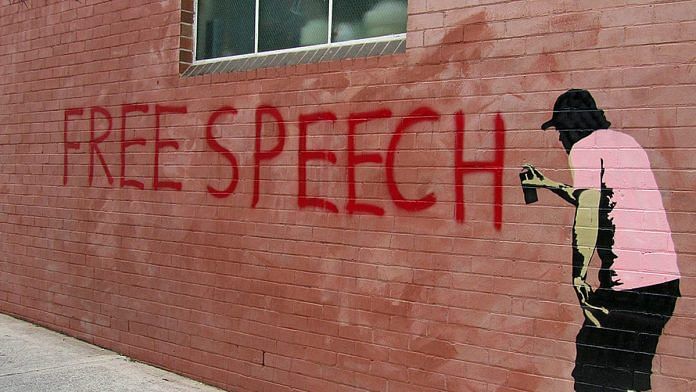A speech on national integrity can get you jailed in India while the President of the United States can openly call Mexicans “rapists” — such is the state of free speech in today’s world.
While genuine criticism meets severe suppression on one end, hate speech runs amok in the garb of free expression on the other. Through both these ways, the far-Right has strengthened its hold in the world and social media allows them to amplify their majoritarianism, xenophobia and communal hatred.
Article 19(1) of the Constitution of India guarantees freedom of speech, although this right is not absolute and comes with some reasonable restrictions outlined under Article 19(2). In recent times, however, the ruling party has gone beyond all semblance of reason and regularly used the Unlawful Activities Prevention Act (UAPA) and the National Security Act (NSA) to crush dissent. These draconian laws allow them to detain those who oppose the government without charges, as has been the case with many of those who protested against the Citizenship Amendment Act.
On the other end of the spectrum is the US model, where the First Amendment provides for almost absolute freedom of speech, except when the speaker intends to incite “imminent lawless action”. Thus, one can make the vilest statements about particular communities without repercussions, which is what allows hate groups such as the KKK (Ku Klux Klan) — a white supremacist hate group — to exist.
Two major free speech challenges faced by world
So, broadly, there are two kinds of challenges that free speech faces in our world today.
First, in most third-world countries like ours, the existing legal machinery is not adequate to guarantee freedom of speech and needs to be revised. Second, in developed countries like the US, free speech is increasingly being equated with absolute speech.
There, the fight for free expression has gone past the noble endeavour of challenging authority and orthodoxy, instead, it has become a tool to normalise hate speech and to silence minorities. In a case as curious as that of ‘Benjamin Button’, the Right wing has appropriated free expression to spread hate with impunity, to speak without challenge.
Words always have consequences. There was a surge in anti-Muslim attacks in the UK, after Prime Minister Boris Johnson called women in burqas “bank robbers”, and similar incidents happen everywhere.
In India, while the government clamps down on its critics, it gives a free pass to those who align with its values. Hate speech can air on national television as long as the targeted community is a minority.
Even by the American standard of “imminent lawless action”, chanting “Desh ke gaddaro ko, goli maaro saalo ko” at rallies would be considered wrong, and yet it seems to be acceptable here.
We must continue to fight for freedom of expression in India but, at the same time, we must be careful not to advocate the other extreme. A right to express one’s opinion is one of the precious gifts of democracy but not when it stifles the voices of others or puts them in danger, freedom of speech must not supersede freedom to life.
‘Keeping Up’ with the times
Social media has given a voice to everyone. But the digital world, like our real world, is not a level-playing field and those with power quickly learned how to use it to their advantage.
In India, on top of direct suppression of online speech by arrests and local internet shutdowns, there are now methods of indirect suppression — troll armies that abuse people and flooding tactics (fake news, propaganda bots, paid commentators) that drown out real voices.
Stick and stones have always broken bones, but 2020 has shown us that words can hurt twice as much.
The ‘Plandemic’ video — which falsely claimed that wearing masks “activates” Covid-19 —and similar sources created a storm of misinformation that caused tremendous loss of life in America.
Later, Trump and his supporters tried to undermine the election process through their baseless accusations. Luckily, after years of not doing anything about disinformation, social media platforms have finally stepped in. Both Twitter and Facebook flagged Trump’s “disputed” claims.
Social media companies should develop clear terms to tackle misinformation and hate speech. Unlike Facebook’s former policy head in India, Ankhi Das, who advised against banning a BJP leader for hate speech, employees must sincerely execute those terms.
Online platforms should make it harder for people to share misinformation, like what Twitter did with Trump: Covering tweets with labels and only letting people share them if they added their own context.
It is most often women and minorities who are targeted online, so companies must employ sufficient moderators to make their platforms a space to share ideas, not to abuse and harass. Absolute freedom of speech, regularly endorsed by intellectuals, may work in a university seminar but in the real world of inequalities, it dehumanises and harms the less powerful.
Sourabh Yadav is a student of Jawaharlal Nehru University, New Delhi




“FREE SPEECH AND INDIAN DEMOCRACY”.
The civilized world people are troubled to discover that India in 2021, murdering, torturing, jailing Indians for exercising their democratic rights to free speech. It would be wise for India to declare as a terroristic regime rather sinuously pretending to be Democratic.
Respectfully submitted
Ramesh Mishra
Canada